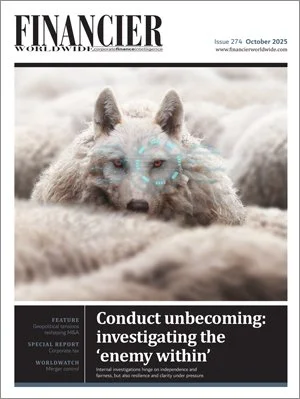Warn without fear: the US AI Whistleblower Protection Act
October 2025 | FEATURE | RISK MANAGEMENT
Financier Worldwide Magazine
Employees working for artificial intelligence (AI) companies in the US currently lack explicit whistleblower protections – a regulatory void that newly proposed federal legislation, the Artificial Intelligence Whistleblower Protection Act (AIWPA), seeks to address.
Introduced in the US Senate on 15 May 2025 by Charles Grassley, chair of the Senate Judiciary Committee and a longstanding advocate for whistleblower rights, the AIWPA is designed to protect individuals who report safety vulnerabilities or violations related to AI systems from employer retaliation.
Its core aim is to empower whistleblowers to raise concerns about potential risks without fear of reprisal.
“The AI Whistleblower Protection Act comes at a critical moment where transparency and accountability standards need to be established through regulation,” says Sophie Luskin, a researcher at the Center for Information Technology Policy at Princeton University. “The timing is particularly urgent given anticipated waves of deregulation coming at the state and federal level.
“When industries are under-regulated, law enforcement agencies become increasingly dependent on insider information to investigate misconduct effectively,” she continues. “There is a sense among AI industry employees that, should they make disclosures on the wrongdoing they witness or suspect, they are not protected by existing laws.”
This perception has been reinforced by attempts from prominent AI companies to silence employees. “OpenAI attempted to require departing employees to sign highly restrictive non-disclosure and non-disparagement agreements,” attests Charlie Bullock, a senior research fellow at the Institute for Law & AI. “This gave rise to an open letter from AI employees calling for a ‘right to warn’ about AI risks, which received considerable press coverage.”
Such efforts to suppress internal dissent, along with resistance to calls from technology leaders for ‘light touch’ regulation, have underscored the need for robust whistleblower protections across the AI sector. These developments have helped pave the way for the introduction of the AIWPA.
Understanding the AIWPA
Modelled in part on the Anti-Money Laundering Act of 2020 and the Whistleblower Protection Act of 1989, the AIWPA offers broad coverage for protected individuals, comprehensive definitions of violations, clear reporting channels, strong anti-retaliation provisions and non-waivable rights.
According to analysis by NquiringMinds, the legislation addresses critical gaps in existing whistleblower laws and equips US regulators to monitor a rapidly evolving industry more effectively.
“The AIWPA offers broad coverage for protected individuals, comprehensive definitions of violations, clear reporting channels, strong anti-retaliation provisions and non-waivable rights.”
The AIWPA explicitly prohibits employment discrimination against whistleblowers who report AI security vulnerabilities or violations. It aims to strengthen existing protections, ensuring that those involved in the development and deployment of AI systems can raise safety and ethical concerns without fear of retaliation.
The Act defines AI systems as those operating under unpredictable conditions, capable of learning from experience and improving over time. These include systems that emulate human perception, cognition, planning, learning, communication or physical action – such as cognitive architectures and neural networks.
The legislation protects individuals from adverse employment actions such as dismissal or demotion. Those who believe they have been wronged may file claims with the Department of Labor and pursue civil actions for reinstatement, double back pay, damages and legal costs. However, these protections do not extend to disclosures made in bad faith.
Organisations involved in AI development or deployment may face new compliance risks stemming from whistleblower complaints about biased algorithms or inadequate safeguards. This will necessitate improved internal record-keeping and communication protocols. The fear of retaliation often deters employees from reporting legitimate concerns, highlighting the importance of robust legal protections.
Although the AIWPA shares objectives with existing US whistleblower programmes, it differs in key respects. “The AIWPA does not offer direct monetary awards for whistleblowers, which are typically only provided when Congress passes comprehensive industry standards,” says Ms Luskin. “It does, however, allow for potential coverage under existing programmes like Dodd-Frank when publicly traded companies violate securities laws in their AI implementations, providing some overlap with established protections.”
Prospects for passage
While the AIWPA represents a significant step toward ensuring ethical and safe AI development by strengthening whistleblower protections, its path to enactment may be complex.
“The bipartisan, bicameral nature of the legislation increases the likelihood of its passage, as opposed to support from just one party in one chamber of Congress,” points out Braden Lawes, senior government affairs analyst at Fisher & Phillips LLP. “However, in addition to possibly taking up another domestic policy mega-bill, lawmakers must also pass 12 appropriations bills as well as the National Defense Authorization Act by 1 October to fund the government in 2026, which may delay action on whistleblower protection legislation.”
As Ms Luskin notes: “there is historic precedent for industry-specific whistleblower laws passing after some form of accident calls attention to the need for whistleblower protections. Take for example, the nuclear energy industry under the 1978 Energy Reorganization Act. Whistleblower advocates are confident that the bill will eventually become law, and hope it does not take catastrophe to push it over the finish line.”
As AI continues to evolve, the AI Whistleblower Protection Act offers a timely framework to support transparency and responsible innovation. By safeguarding those who raise legitimate concerns, it aims to foster a more accountable and ethically grounded AI industry.
© Financier Worldwide
BY
Fraser Tennant


